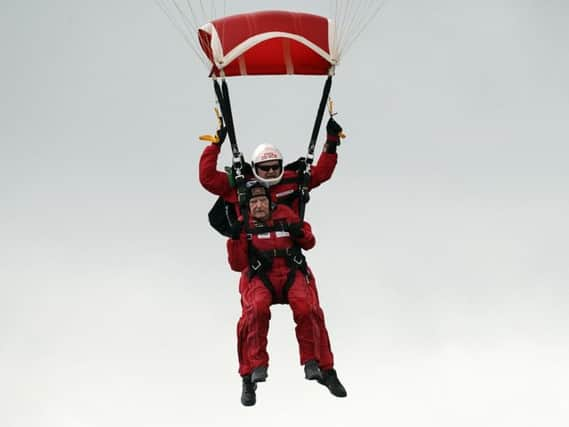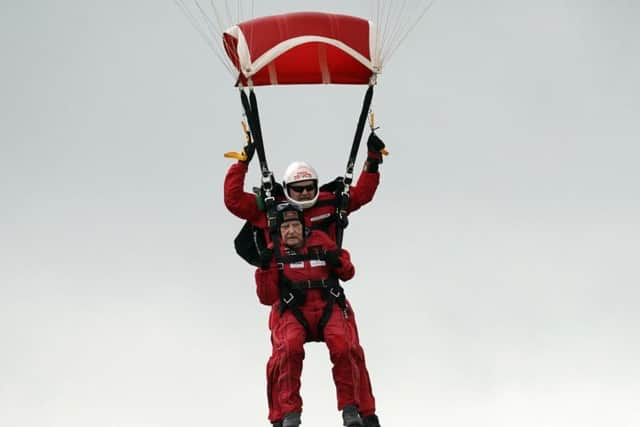Scottish veteran, 94, repeats Normandy parachute drop to mark D-Day


Mr Hutton jumped alongside Harry Read, 95, out of a Cessna aircraft in tandem this afternoon into Sannerville.
They were followed by a giant Union Flag to roaring cheers from the large crowd that had gathered by the field.
Advertisement
Hide AdAdvertisement
Hide AdAndrew Jackson, deputy commander of the Parachute Regiment's 16 Air Assault Brigade, was also taking part in the drop.


Mr Hutton said after the jump that it was "great to be back on French soil".
"It's such a relief to get the 75th out of the way," he said.
However, the former paratrooper said he was concerned the jump would not go ahead.
"We were looking out of the window, all the mist was coming in," he said.
"[I thought] all this bloody way and we're not going to get out of the aircraft."
However, Mr Hutton, who thinks "he should have more sense at 94", said the landing was not as smooth as he had hoped as he joked about a sore backside after he "landed on a bunch of boulders".
Reflecting on his jump in 1944, Mr Hutton said:"I enjoyed the fall, I had done a lot of free falling. But [the French] thought that we were German soldiers on exercise."
Advertisement
Hide AdAdvertisement
Hide AdMr Hutton was 19 when he served in the 13th Lancashire Parachute Battalion.
He previously recalled: “We were jumping from 500 feet, so there was no point in a reserve chute. If the main hadn’t opened – well - goodnight.”
Mr Hutton had also made the jump five years ago for the 70th anniversary of D-Day.
As recently as 2013, he was performing solo jumps in the Netherlands. However, a career in parachuting – all those jarring encounters with the ground - had finally taken its toll as he entered his 90s.
Mr Hutton, who initially signed up as a boy soldier in Stirling aged 15, still has shrapnel lodged in his stomach after he was injured in an explosion later in the Normandy campaign.
He said: “Three weeks after the landings I was on a night patrol.
“Germans saw us in the moonlight and threw grenades. Such was the noise I didn’t realise I had been wounded.
“It was only when I got back to my hole in the ground, I couldn’t feel my legs.”
Advertisement
Hide AdAdvertisement
Hide AdNow a retired Salvation Army officer living in Bournemouth, Dorset, Mr Read was a 20-year-old wireless operator with the Royal Signals who had a battery the size and weight of a toolbox strapped to his right leg when he was pushed out of the plane in the early hours of 6 June 1944.
Among some 280 paratroopers, the pair boarded a Dakota aircraft in Duxford, Cambridgeshire, and fly to Sannerville with the Red Devils, where they performed a tandem jump and landed in fields used as a drop zone for the 8th (Midlands) Parachute Battalion.
That battalion went on to destroy bridges in a bid to restrict German movements during the missions.
Col Jackson had huge praise for the veterans, saying: "I think it's pretty brave of them, to say the least.
"It's a real privilege to have these guys out here.
"As they have got older, fewer and fewer have been able to parachute."
Flight Lieutenant Paul Wise, who piloted the Dakota leading the fleet of aircraft before dropping the military parachutists, said of the veterans before the jump: "It shows the strength, courage, determination, camaraderie - everything we are all about.
"We want to show the next generation what these gentlemen did."
In true tribute to the circumstances 75 years ago, the weather was still watched closely and is a big consideration as to whether the drop would take place.
Advertisement
Hide AdAdvertisement
Hide AdSeb Cox, chief historian for the Royal Air Force, said paratroopers played a vital role in Operation Overlord by ensuring the beaches had safe exits for soldiers and also taking hold of all the bridges so they could advance while causing "havoc" for the enemy.
He said: "This caused such a confusion and panic for the Germans.
"If they didn't hold the bridges, there were barriers preventing them from advancing.
"One of the things people don't understand about D-Day - they think it's just about June 1944 and landing craft on the beaches.
"But for the air force, the Battle of Normandy started in March.
"They had already suffered 12,000 casualties by this time (D-Day)."
